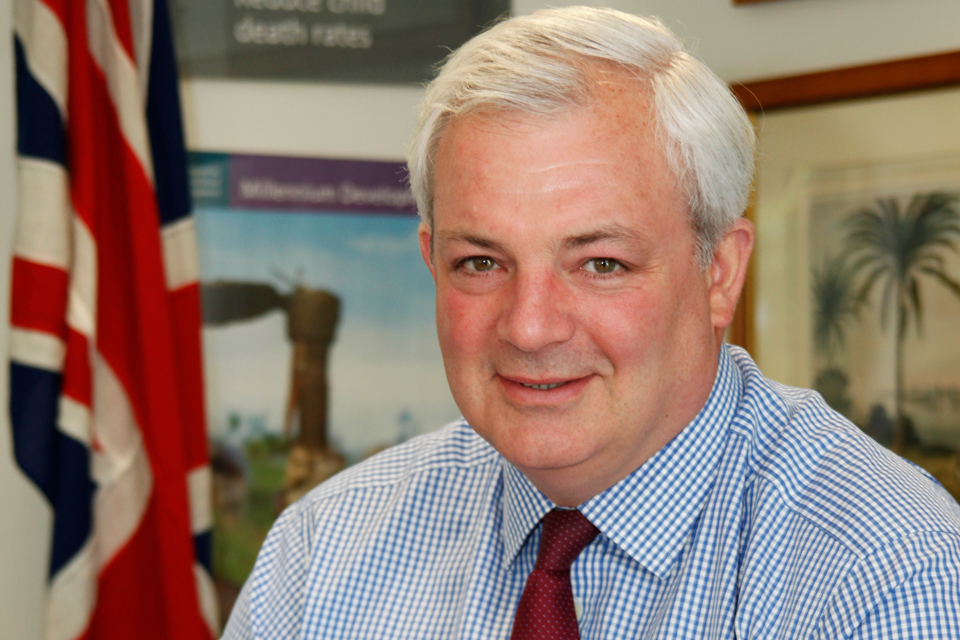Stephen O'Brien: Family planning to transform women's lives
Parliamentary Under Secretary of State Stephen O'Brien speaks at the opening of the International Conference for Family Planning in Senegal.

I am delighted to be here with you to mark the opening of this conference. I travelled here last night from Mali where I had the opportunity to see for myself the realities that women and young girls face in getting access to comprehensive reproductive health services.
And this morning here in Dakar, I visited an Association Senegalaise pour le Bien-Étre Familial (ASBEF), an International Planned Parenthood Federation member association, to see women receiving reproductive health information, services and supplies. There I met a woman called Jan. Jan told me how she had wanted to have two children. Having now had 10 children, she was at the clinic to get family planning so she would not face any further unintended pregnancies and would be able to return to her studies and support her family.
It is for Jan and the 215 million like her who have an unmet need for family planning that this conference is happening. And it is also the reason that the UK is committed to doubling our efforts for women’s health to save the lives of at least 50,000 women in pregnancy and childbirth, enable 10 million more women to use modern methods of family planning and prevent more than 5 million unintended pregnancies by 2015.
Why are we doing this?
For two key reasons:
Firstly, we know that women and girls hold the key to development. The UK has reorientated its aid programme to put women at the heart of its development efforts, empowering women to make choices for their own and their families’ health and lives, deciding for themselves: whether, when and how many children to have.
Secondly, it is time to put Family Planning back at the forefront of reproductive health and development. Investing in reproductive, maternal and newborn health is excellent value for money and, family planning is a “best buy” in global health due to its low cost and far reaching benefits.
Of course, I must also mention the challenge of population growth and its impacts on countries. This is an issue that the UK Department for International Development (DFID) will not shy away from. However, let me make one thing absolutely clear: the British Government does not support programmes that coerce individuals and couples to have fewer children. Population “control”, in the sense of government edicts and targets on fertility levels, has no ethical place in contemporary rights based development policy.
In practice taking this agenda forward means a wide variety of work for DFID.
DFID is providing £100 million over five years to the United Nations Population Fund’s (UNFPA) Global Programme for Reproductive Health Commodity Security that is supporting National Governments to improve their supply chains for family planning and other reproductive health medicines.
I also visited this programme whilst in Mali and was impressed to see women at clinics outside of Bamako supported by Marie Stopes International being given access to contraceptive implants that will protect them for up to five years from unintended pregnancy. I also visited the central medical stores where I saw newly arrived shipments of implants and other commodities procured by UNFPA with DFID support. My hope is that next time I return, these supplies will have been replaced by further shipments and that the commodities I saw would be saving the lives of women across Mali.
And it for this reason, that I am pleased to announce that we have just agreed to provide an additional £35 million through that programme. Our funding will increase method mix by enabling at least 1.6 million more women to have access to contraceptive implants. Our funding will also support the Co-ordinated Assistance for Reproductive Health Supplies (CARHs) Group - a rapid response -style unit which will procure and deliver up to 6 months worth of contraceptive supplies to countries where stocks are running out to give local providers an opportunity to find lasting solutions.
Empowering adolescent girls is another key part of our strategy. In Rwanda, the Ministry of Health, Nike Foundation and DFID are working to make a real difference to the lives of 10 -12 year olds. The programme provides young girls with a mentor and safe space to learn about their bodies and reproductive health in a fun and creative way. We also recognise that the barriers to a healthy life are often social or financial so the girls in this programme also get training in finance and literacy.
I believe that by working together, we can transform the lives of women, their families and communities, now and for generations to come. The opportunity is now. The challenge before us is clear. Let’s make sure we use these next few days to really advance our collective cause.
I wish you a successful conference. Thank you.